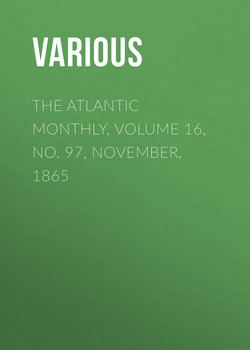Читать книгу The Atlantic Monthly, Volume 16, No. 97, November, 1865 - Various - Страница 6
DOCTOR JOHNS
ОглавлениеXXXVII
Meantime Reuben was gaining, month by month, in a knowledge of the world,—at least of such portion of it as came within the range of his vision in New York. He imagined it, indeed, a very large portion, and took airs upon himself in consequence. He thought with due commiseration of the humble people of Ashfield. He wonders how he could have tolerated so long their simple ways. The Eagle Tavern, with its creaking sign-board, does not loom so largely as it once did upon the horizon of his thought. That he should ever have trembled as a lad at walking up to the little corner bar, in company with Phil! And as for Nat Boody, whose stories he once listened to admiringly, what a scrubby personage he has become in his eye! Fighting-dogs, indeed! "Scamp" would be nothing to what he has seen a score of times in the city!
He has put Phil through some of the "sights": for that great lout of a country lad (as Reuben could not help counting him, though he liked his big, honest heart for all that) had found him out, when he came to New York to take ship for the West Indies.
"I say, Phil," Reuben had said, as he marched his old schoolmate up Broadway, "it's rather a touch beyond Ashfield, this, isn't it? How do you think Old Boody's tavern and sign-board would look along here?"
And Phil laughed, quietly.
"I should like to see old Deacon Tourtelot," continued Reuben, "with Huldy on his arm, sloping down Broadway. Wouldn't the old people stare?"
"I guess they would," Phil said, demurely.
"I wonder if they'd knock off at sundown Saturday night," continued Reuben, mockingly.
And his tone somehow hurt Phil, who had the memories of the old home—a very dear one to him—fresh upon him.
"And I suppose Miss Almiry keeps at her singing?"
"Yes," said Phil, straining a point in favor of his townswoman; "and I think she sings pretty well."
"Pretty well! By Jove, Phil, you should have been at the Old Park night before last; you would have heard what I call singing. It would have stirred up the old folks of Ashfield."
And Phil met it all very seriously. It seemed to him, in his honesty, that Reuben was wantonly cutting asunder all the ties that once bound him to the old home. It pained him, moreover, to think—as he did, with a good deal of restiveness—that his blessed mother, and Rose perhaps, and the old Squire, his father, were among the Ashfield people at whom Reuben sneered so glibly. And when he parted with him upon the dock,—for Reuben had gone down to see him off,—it was with a secret conviction that their old friendship had come to an end, and that thenceforth they two could have no sympathies in common.
But in this Phil was by no means wholly right. The talk of Reuben was, after all, but the ebullition of a city conceit,—a conceit which is apt to belong to all young men at some period of their novitiate in city life. He was mainly anxious to impress upon Phil the great gain which he had made in knowledge of the world in the last few years, and to astound him with the great difference between his present standpoint and the old one, when they were boys together on the benches of the Ashfield meeting-house. We never make such gains, or apparent gains, at any period of life, it is to be feared, without wishing to demonstrate their magnitude to the slow coaches we have left behind.
